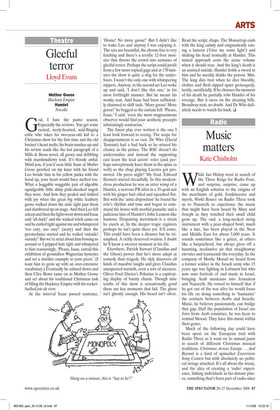Gleeful terror
Lloyd Evans
Mother Goose Hackney Empire Hamlet
Novello God, I hate the panto season. Especially the reviews. You get some cynical, steely-hearted, acid-flinging critic who takes his two-year-old kid to a Christmas show for the first time and the old bruiser’s heart melts, his brain mushes up and his review reads like the last paragraph of a Mills & Boon novel, all gooey and dribbling with marshmallowy tosh. It’s bloody awful. Mind you, if you’d seen little Isaac at Mother Goose perched on my knee with his friend Leo beside him in his yellow parka with the hood up, your heart would have melted too. What a huggable wuggable pair of idgeable squidgeable little shiny pink-cheeked angels they were. And how they pealed and tinkled with joy when the great big white feathery goose walked down the aisle right past them and clambered up on stage. And then Leo fell asleep and then the lights went down and Isaac said ‘all dark!’ and the wicked witch came on and he curled tight against me and whimpered ‘too cary, too cary!’ (scary) and then the pyrotechnics started and he wailed ‘outside! outside!’ But we’re strict about him bossing us around so I gripped him tight and whispered to him reassuringly, ‘Please, Isaac, curtail this exhibition of groundless Wagnerian hysterics and set a sturdier example to your peers.’ (I want him to grow up with an over-extensive vocabulary.) Eventually he calmed down and then Clive Rowe came on as Mother Goose and set about his traditional Christmas task of filling the Hackney Empire with his rocketfuelled joie de vivre.
At the interval Isaac passed sentence. ‘Home! No more goose!’ But I didn’t like to wake Leo and anyway I was enjoying it. The sets are beautiful, the chorus-line is very fetching and there’s a terrific 12-foot monster that throws the crowd into ecstasies of gleeful terror. Perhaps the script could profit from a few more topical gags and at 170 minutes the show is quite a slog for the underfours. I wasn’t the only one with whimpering nippers. Anyway, in the second act Leo woke up and said, ‘I don’t like this one,’ in his most forthright manner. But he meant his wonky seat. And Isaac had been sufficiently charmed to shift tack. ‘More goose! More goose!’ he begged as the curtain fell. ‘Please, Isaac,’ I said, ‘even the most magnanimous observer would find your aesthetic precepts infuriatingly contrarian.’ The finest play ever written is the one I least look forward to seeing. The scope for disappointment is so vast. Dr Who (David Tennant) had a bad back so he missed his chance as the prince. The RSC doesn’t do understudies and instead the supporting cast learn the lead actors’ roles (and perhaps surreptiously knee them in the spine as well) so the chap playing Laertes got promoted. On press night? My God. Edward Bennett started dreadfully. In this moderndress production he was an utter wimp of a Hamlet, a nervous PR idiot in a 39-quid suit with his ginger hair oiled and squashed flat. But with the ‘antic disposition’ he found the role’s rhythm and tone and began to command the house with morbid panache and a judicious hint of Hamlet’s John Lennon-like humour. Despairing merriment is a strain he excels at. In the deeper tragic registers perhaps he isn’t quite there yet. It’ll come. This could have been a disaster but he triumphed. A richly deserved ovation. I doubt he’ll know a sweeter moment in his life.
Elsewhere, Patrick Stewart (Claudius and the Ghost) proves that he’s more adept at comedy than tragedy. He slyly discovers all kinds of macabre laughs and gives Claudius unexpected warmth, even a sort of niceness. Oliver Ford Davies’s Polonius is a captivating display of barmy charm. Though nine tenths of this show is sensationally good there are key moments that fail. The ghost isn’t ghostly enough. His beard isn’t silver. Read the script, chaps. The Mousetrap ends with the king calmly and enigmatically raising a lantern (‘Give me some light’) and shaking his head ironically at Hamlet. This muted approach costs the scene volume when it should roar. And the king’s death is an assisted suicide. Hamlet holds a sword at him and he meekly drinks the poison. Mm. The king dies best when he dies bloodily, clothes and flesh ripped apart grotesquely, lustily, sacrificially. If he chooses the moment of his death he partially robs Hamlet of his revenge. But it saves on the cleaning bills. Broadway next, no doubt. And Dr Who definitely needs to watch his back. ❑






















































































































 Previous page
Previous page